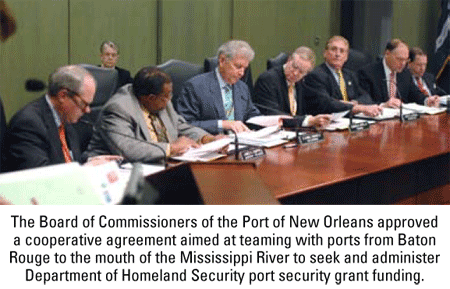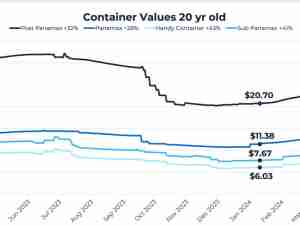
Five ports to join forces, speak with one voice to secure lower Mississippi river
The Board of Commissioners of the Port of New Orleans unanimously approved a cooperative endeavor agreement aimed at teaming with ports from Baton Rouge to the mouth of the Mississippi River to seek and administer Department of Homeland Security port security grant funding.
If approved by all port authorities, the Lower Mississippi River Port Wide Strategic Security Council would include the Port of Greater Baton Rouge, Port of South Louisiana, Port of New Orleans, St. Bernard Port, Harbor and Terminal District, and the Plaquemines Port, Harbor and Terminal District.
'We want to take a collaborative approach to security funding,' said Gary LaGrange, president and CEO of the Port of New Orleans. 'The Lower Mississippi River is the most important waterway in our nation and it should be secured accordingly.'
The five participating ports received a combined $11.4 million in security grants in 2006. Together, leaders of each port want to work to develop a comprehensive surveillance system at their docks and throughout the Lower Mississippi River. The Council's plans are to map a strategy and to determine how the grant money should be divided to achieve the goal.
The overall goal of the Security Council is to ensure the ports along the Lower Mississippi River become the safest and most protected maritime complex in the nation, utilizing state-of-the-art technology, processes and training. The group will form necessary bylaws and organizational rules consistent with its purpose and bring all jurisdictions together to understand the need for joint communication, coordination, cooperation and good-faith working relationships to achieve the goal.
One hurdle the Council hopes to overcome is a 25 percent match required by the federal government in order to receive the grant money. Due to ongoing recovery efforts from Hurricanes Katrina and Rita, ports along the Lower Mississippi River have asked DHS through Louisiana's Congressional Delegation to waive the required match.
'It is great that DHS is making money available for port security projects,' LaGrange said. 'However, we are in an unfortunate situation where recovery costs could likely hamper our ability to meet the match requirements.'
Council members will continue to work through Louisiana's congressional delegation to seek a waiver of the match requirements. DHS has not responded to the delegation's initial request for a waiver.








